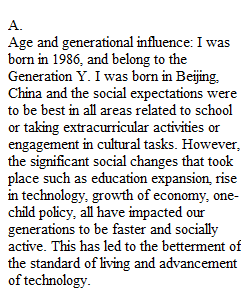


Q Journal Questions A. Age and generational influences: When you were born, what were the social expectations for a person of your identity? Do you identify with a particular generation (e.g., baby boomers, Gen X or Y, second-generation immigrants, etc.)? How have your values and worldview been shaped by the social movements of or influences on your generation (e.g., the Great Depression, World War II, the Vietnam War, women's movement, Stonewall, Americans with Disabilities Act, civil rights movement, social media, an economic downturn, political events in another country)? D. Developmental or other disability: Do you identify as someone living with a visible disability or a nonvisible disability (e.g., chronic pain, psychiatric or learning disability)? If no, has your personal or professional life been affected by others with disabilities (e.g., friend, family member, partner, or coworker with a disability)? How has disability status—either your own disability or that of someone else in your life—affected your life and opportunities? R. Religion and spirituality: Were you brought up in a religious or spiritual tradition? Do you identify with a religion or have a spiritual practice now? How were your values and goals shaped by your religious or nonreligious upbringing? E. Ethnic and racial identity: What do you consider your ethnic or racial identity to be? If you were adopted, what are the identities of your biological and adoptive parents? How do other people identify you? Are these the same? Are there ethnic or racial differences within your family? S. Socioeconomic status: What social class did you grow up in, and what do you consider your socioeconomic status to be now? When you were in high school, what were the educational and work opportunities available to you? S. Sexual orientation: Do you identify as gay, lesbian, bisexual, or heterosexual? If you are heterosexual, do you have a family member or friend who is gay? Is your family accepting of a gay member? I. Indigenous heritage: Do you belong to a Native tribe or nation (for example, Native Hawaiian, First Nations, Alaska Native, or American Indian)? Did you grow up on or near a reservation or Native community? Do you seek to connect or reconnect with your Native community? N. National origin: Are you a U.S. citizen, an international student, or immigrant? Were you born in the United States? Do you (and your parents and grandparents) speak English as a first language? How has your nationality affected your life and opportunities? G. Gender: What were and are the gender-related roles and expectations for you in your family of origin and current family, in your work setting, and in relation to your other cultural identities? How have these expectations affected your choices in life? Have a look at your Cultural Sketch, and underline the influences in which you are are a member of the dominant group. For example, if you are a young or middle-aged adult, put a star next to Age and generational influences (because you are not a member of the minority groups of children or older adults). If you do not have any disability, put a star next to Developmental and other disabilities (because you are a member of the nondisabled dominant group). If you grew up or currently identify as Christian or secular, put a star next to Religion and spirituality. If you are of Euro-American heritage, put a star next to Race/ethnicity. If you grew up middle-class or currently are middle-class, put a star next to Socioeconomic status. If you are heterosexual, put a star next to Sexual orientation. If you have no Indigenous (American Indian, Alaska Native, or other Native) heritage, put a star next to Indigenous heritage. If you were born in the United States and are a U.S. citizen, put a star next to National origin. If you are a man, put a star next to Gender. You have just mapped out your personal Constellation of Privileges. Recognizing where you hold privilege is important, because the areas in which you have privilege are those in which you are most likely to lack awareness and knowledge regarding members of the related minority groups that do not have such privileges. However, as you may have noted, identity is not always easy to categorize. For example, a biracial individual holds membership in both a dominant and minority racial/ethnic group. Similarly, a white gay man belongs to the dominant racial/ethnic group and minority sexual orientation group. This exercise highlights how complex cultural influences are, and the importance of being especially aware of those areas in which you hold privilege. You will be asked to reflect on this later in the course. Due
View Related Questions